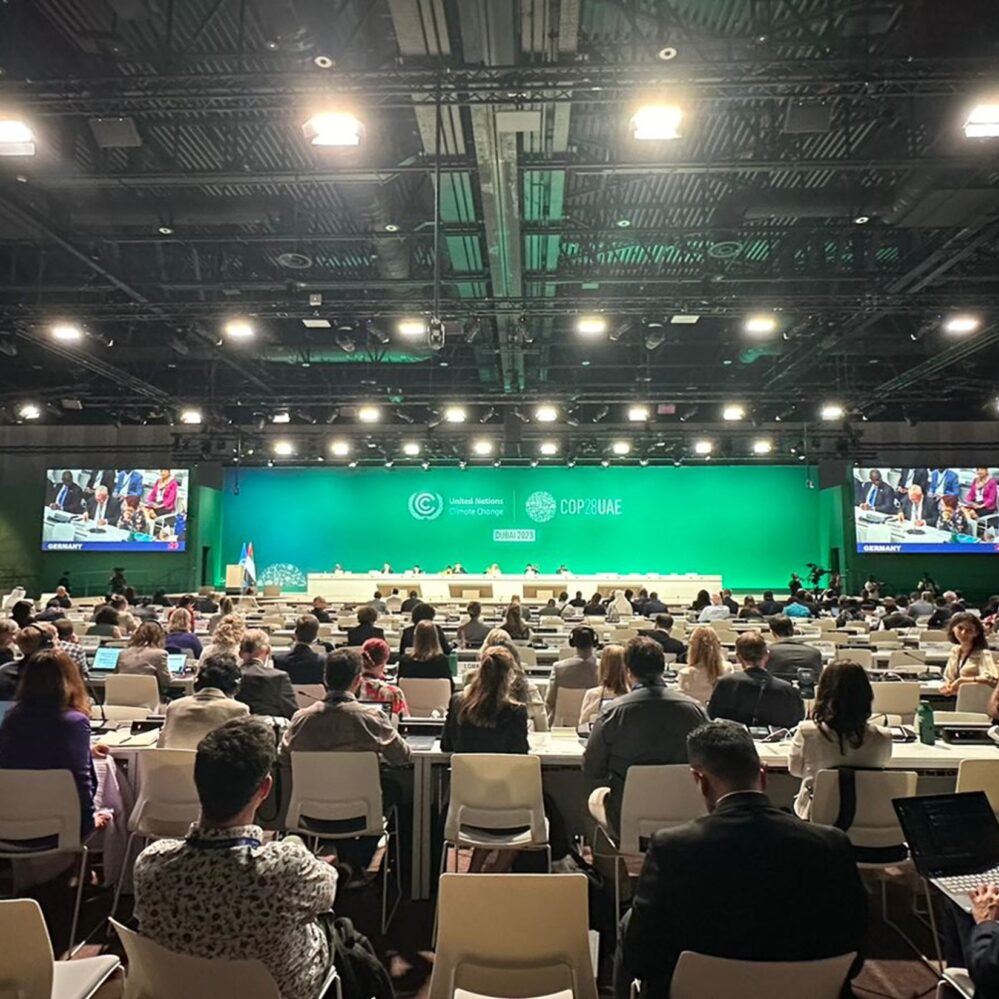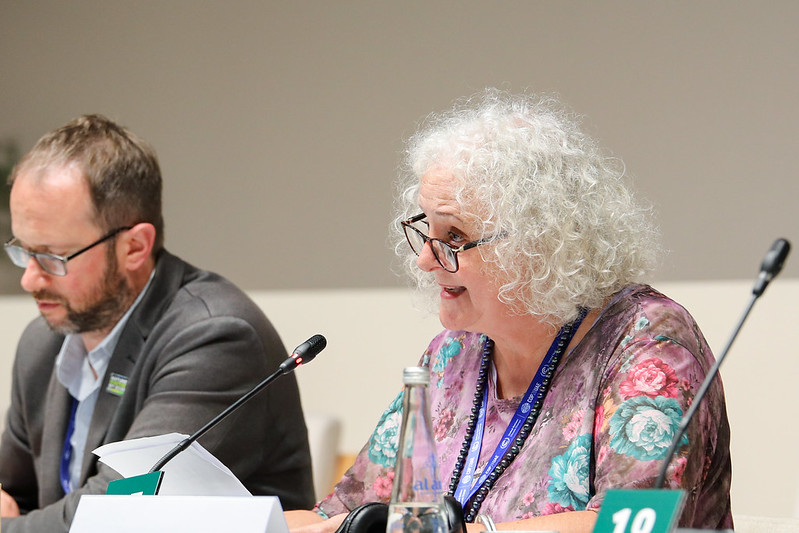Held under the theme “Building Resilient and Healthy Cities for a Sustainable Future,” the third Ministerial Meeting on Urbanization and Climate Change emphasized the vital role cities must play in addressing the climate crisis and accelerating sustainable urban development. More than a dozen local and regional leaders spoke across five separate events as part of the Meeting.
The COP process’ third Ministerial Meeting on Urbanization anchored COP29’s Tourism, Transport, and Urbanisation Day on 20 November. This year, and for the first time, the Ministerial offered a High-Level Opening and four thematic High-Level Roundtables, focusing on Green Construction and Buildings, Urban Transport and Infrastructure; Nature, Health, and Resilience in Cities, and Urban Climate Finance.
The Ministerial was co-hosted by a broad range of partners, demonstrating the collective nature of the issue. These co-hosts include the COP29 Presidency, the United Nations Human Settlements Programme (UN-Habitat), the State Committee on Urban Planning and Architecture of the Republic of Azerbaijan, United Nations Climate Change High-Level Champion on COP29, Ministry of Digital Development and Transport of the Republic of Azerbaijan, the United Nations Environment Programme (UNEP), World Health Organisation (WHO), the International Transport Forum and further UN Agencies, international organizations and Multilateral Development Banks with the support of Bloomberg Philanthropies and the Local Governments and Municipal Authorities (LGMA) Constituency to UNFCCC.
Anacláudia Rossbach, United Nations Under-Secretary-General and Executive Director, UN-Habitat, stated that the Ministerial Meeting comes at a critical moment as countries are revising their Nationally Determined Contributions (NDCs), emphasizing the critical need for collective action.
“There is only one road to be pursued, one track, the one we walk collectively, where social, urban, and climate needs are addressed harmoniously over solid, economic ground,” said Ms Rossbach. She added: “Yes, we do need more finance flowing to cities, but we do need to plan and prioritize. Land is scarce and needs to be fulfilled with social and ecological functions. Social and housing needs are large; we take care of people, and people take care of the planet. And we should leave no one behind, but we know that already,” she concluded during the event.
New declaration highlights health as a critical goal
The Ministerial Meeting underscored key commitments and strategic actions set to shape the road to COP30 and beyond. One of them is the launch of the Multisectoral Action Pathways (MAP) for Resilient and Healthy Cities Declaration. Over 160 stakeholders, including countries and cities, as well as the LGMA, have already endorsed the initiative, which aims to guide climate negotiations and policy discussions through COP30, highlighting the critical role of cities in tackling climate vulnerabilities and fostering a sustainable future.
“COP28 was a step forward, putting the multilevel action in their own agenda. The COP29 MAP will support COP to COP continuity across multilevel governance and continue to amplify the role cities, states and regions are playing in regional-national level targets for reducing emissions and adapting to climate change,” stated Nigar Arpadarai, UN Climate Change High-Level Champion for COP29.
In addition, the Ministerial Meeting marked the signing of the Baku Continuity Coalition on Urban and Multilevel Climate Action, bridging the presidencies of COP27, COP28, COP29, and COP30 in partnership with UN-Habitat. The Coalition aims to ensure consistent urban climate agendas across COPs and encourage future hosts to prioritize urban resilience and adaptation.
“To the national leaders in this room, my message is clear: Cities are ready and willing to help. We are innovative, determined, and already driving the change on the ground. We will never give up; you can rely on that. But, together, we can all do so much better,” said Minna Arve, Mayor, City of Turku, Finland and ICLEI First Vice President, while delivering the LGMA Constituency’s Statement.
Mayor Arve emphasized the three asks that hundreds of towns, cities, and regions under the LGMA Constituency have proposed to COP29 negotiators through the COP29 LGMA Joint Position: Accelerate multilevel action, finance urbanization fairly, and integrate climate action into all sustainability agendas.
“This means phasing out fossil fuels quickly and keeping promises. We need climate finance that focuses on grants—not loans—ensuring a fair transition for all levels of government,” sated Mayor Arve, who also referred to COP28’s multilevel action momentum, highlighting that the CHAMP initiative is a practical model for its implementation.
Continuity between initiatives, and at global platforms
In a promising step toward these goals, the Ministerial Meeting recognized existing partnerships and initiatives, such as the collaboration between the Slovak Ministry of Environment and UN-Habitat on the Sustainable Urban Resilience for the Next Generation (SURGe) Initiative—formalized through a Letter of Intent signed earlier this month at the World Urban Forum—was highlighted as a key example of how national governments are advancing urban resilience through multilevel climate action.
Gregor Robertson, Special Envoy for Cities in CHAMP, GCoM Global Ambassador, and former Mayor of Vancouver, Canada, saluted the COP29 Presidency on these initiatives, which will ensure the ongoing progress of CHAMP towards COP30. “CHAMP rapidly became a beacon for multilevel climate action with 74 member countries committed to empowering cities, states and regions. CHAMP exemplifies how national and subnational governments can unite and turn the tide on this climate crisis,” he stated.
From the G20 in Rio to the COP29 in Baku subnational leaders have been “relentless” in their call for greater collaboration with national governments and climate action. Mr Robertson called for more countries to join CHAMP and to existing signatories to deliver their pledge to include subnational governments in their development process and content of their NDCs, adaptation plans and biodiversity strategies.
Finally, the Ministerial Meeting, through MAP, recognized the importance of strengthening global event synergies. Leaders stressed the need to align future climate and urbanization events to enhance the multilevel action momentum with a focus on urban areas.
All these initiatives announced at the Ministerial were presented by Anar Guliyev, Chairman of the State Committee on Urban Planning and Architecture (SCUPA) of the Republic of Azerbaijan, who emphasized the importance of building linkages between COPs, World Urban Forum and the World Environment Day.
Baku will host both the 2026 World Urban Forum (WUF13) and World Environment Day. “These initiatives send a powerful message, underscoring our shared commitment to shaping the future of cities through innovation, collaboration, and a strong focus on climate actions,” said Mr Guliyev.
The second Ministerial Meeting on Urbanization and Climate Change was held in Dubai at COP28. This meeting built on the outcomes of that meeting, as well as on the inaugural meeting in Sharm-El-Sheikh at COP27.
The Ministerial Meeting was followed by a press conference on the outcomes of the Ministerial. Mayor Minna Arve spoke on behalf of the LGMA, and ICLEI. She said, “Cities are on the frontline of climate action. To meet our climate goals, we must harness the power of sustainable urban development… Our message as cities to all around is clear: integrate, invest, implement.”
Read the press release on the outcomes of the Ministerial.
Watch the full High-Level Opening of the Ministerial webcast.




